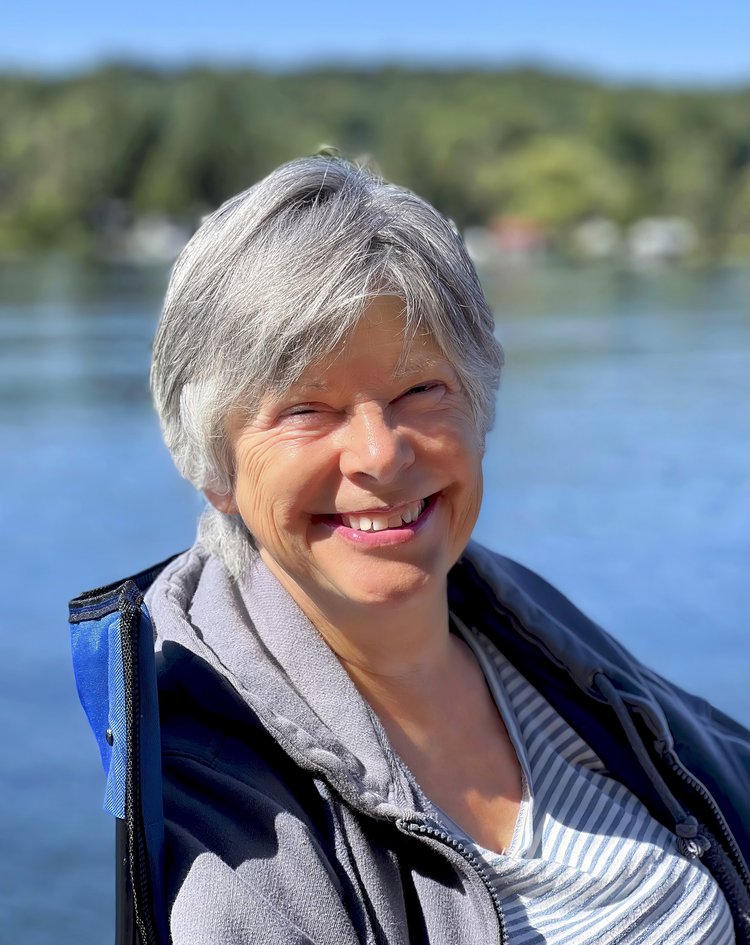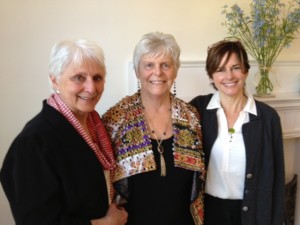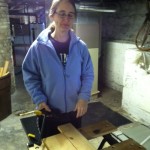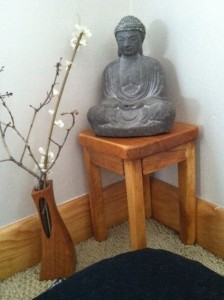Monday was glorious. Finally the nausea from radiation wore itself out, the sun shone with the bright surprise that I associate only with northern Michigan. It got up to almost 60. Jerry and I raked a bit of the winter debris from our miniscule yard, shoveled the last of the snow out from under the hydrangea and azaleas, chopped up the ice underneath, and when I got tired (quickly), I sat in a lawn chair for half an hour letting the sun blast away on my face. In the afternoon, we went downtown to see Quartet (I loved it: with Maggie Smith, and Dustin Hoffman’s debut as director/producer). We ate downtown, a normal meal, and I had my first glass of wine in months.
 Life is fluctuation: Tuesday, back to chemo. I don’t have a port in my chest. The doctor and I decided with only six chemos, why bother, and there’s some risk. So, the nurse got the needle in a vein, but apparently it was in the wall of the vein. Nothing could get through. She wiggled it around for a while. Ugh. She tried a second vein. Then she tried one on the right arm. It seemed to go in but the drip was too slow. She called in the “lower arm and hand vein specialist,” who was able to find a good vein farther down my arm. Did you know that the farther toward the extremities you go, the more sensitive the body is? Hands, feet, full of nerve endings. But after it was in, all was well. I slept for most of the four hours of drip—it’s the Benedryl (for avoiding any allergic reactions) that pretty much knocks me out.
Life is fluctuation: Tuesday, back to chemo. I don’t have a port in my chest. The doctor and I decided with only six chemos, why bother, and there’s some risk. So, the nurse got the needle in a vein, but apparently it was in the wall of the vein. Nothing could get through. She wiggled it around for a while. Ugh. She tried a second vein. Then she tried one on the right arm. It seemed to go in but the drip was too slow. She called in the “lower arm and hand vein specialist,” who was able to find a good vein farther down my arm. Did you know that the farther toward the extremities you go, the more sensitive the body is? Hands, feet, full of nerve endings. But after it was in, all was well. I slept for most of the four hours of drip—it’s the Benedryl (for avoiding any allergic reactions) that pretty much knocks me out.
I think I snored. There were four others there. I felt bad about it, but they all swore I didn’t.
Monday was Earth Day, and I was thinking, what is all this blog-writing, this general passion for memoir, this artistic spilling of the gut? I sometimes feel foolish, or useless, making my writing a higher priority than joining the groups fighting to save our environment.
No. Not “the environment.” They’re fighting to keep carp out of the Great Lakes, they’re fighting to save a 300-year-old tree from the road crews. “Heaven is precision,” says Christian Wiman. “What I crave is writing that gets right down to the nub of Now.”
As the late, great James Wright said, “I want the “pure, clear word.”
This is the thing. The immediate, personal word. The lyric impulse.
The needle in a vein.
Wiman reminds us (in his new book, My Bright Abyss: the Meditations of a Believer), that It was the pure lyric spirit of the poet Osip Mandelstam that Stalin couldn’t  abide, that put Mandelstam (pictured here) finally in a concentration camp where he died. It was, says Wiman, “the existential liberty and largess, the free-singing soul that, Stalin seemed to sense, would always slip free of the state’s net. People who think poetry has no power have a very limited conception of what power means. Even now, in this corporate country, where presidents do not call up poets on the telephone, some little lyric is eating into the heart of money.”
abide, that put Mandelstam (pictured here) finally in a concentration camp where he died. It was, says Wiman, “the existential liberty and largess, the free-singing soul that, Stalin seemed to sense, would always slip free of the state’s net. People who think poetry has no power have a very limited conception of what power means. Even now, in this corporate country, where presidents do not call up poets on the telephone, some little lyric is eating into the heart of money.”
Elizabeth Bowen: “To turn from everything to one face is to find oneself face to face with everything. “
George Oppen: “I think there is no light in the world / but the world. And I think there is light.”
I can’t justify the books of poems—or essays—I’ve written, I can’t justify my mornings at the computer, tapping out words that aren’t trying to persuade, aren’t trying to fix or mend, aren’t trying to explain. They’re trying to sing, I guess. They seem to want to be written, whether I win big prizes with them or not.
And writing about this cancer: I use the word “about,” but that’s a misnomer, really. The cancer’s a force behind the words. It’s one of the  tensions that will play in the poem even if it doesn’t make an actual appearance. It does often make an appearance. It’s on my mind. How to keep it in its place, so the poem opens out into the unknown instead of locking itself down in fascination with details or wanting to narcissistically TELL ALL. In other words, how to make a true poem. Or a true essay. Or a true story. I have no answers. I turn to others’ poems and essays—like Christian Wiman’s memoir above, about his cancer and his faith—where I can watch how it’s done well (I think he does it well), or not so well. And turn to the masters, them first and last, the words that have lasted a lot longer than blog posts.
tensions that will play in the poem even if it doesn’t make an actual appearance. It does often make an appearance. It’s on my mind. How to keep it in its place, so the poem opens out into the unknown instead of locking itself down in fascination with details or wanting to narcissistically TELL ALL. In other words, how to make a true poem. Or a true essay. Or a true story. I have no answers. I turn to others’ poems and essays—like Christian Wiman’s memoir above, about his cancer and his faith—where I can watch how it’s done well (I think he does it well), or not so well. And turn to the masters, them first and last, the words that have lasted a lot longer than blog posts.



